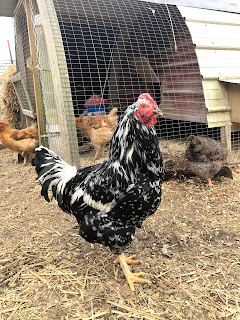They are, in this sense if in few others, well-trained. When the urge makes itself known to one or the other of them, he or she will take up position by the front door. We take the hint, gather up the leashes and proceed outside and down the driveway. It needn't take long. Besides, I have other things to do. Call and response. A biological liturgy of need. Down and back. Mission accomplished.
But that is precisely what rarely happens.
They sniff. They circle. They stretch to the full length of their recoiling leashes. They explore. Tir routinely seizes the opportunity to lay on the driveway or the road out front, roll over on his back and signal his desire to have his tummy rubbed. He never extends such an invitation inside. It is a ritual confined to the driveway or the road; if coerced, perhaps just off the gravel, on the grass. Nia, for her part, is busily locating any morsel - a fallen walnut, a deer dropping, or a clod of potting soil - to chew and swallow. This, for her, is a culinary treasure hunt. Conspicuously absent from any of this perambulation is bodily relief. We have made the trip outside for this singular purpose, but it is only accomplished after my patience is exhausted, as demonstrated by tugs and verbal harassment and much stomping of feet.
It has happened yet again. Tugs, barking (mine, not theirs), coercion, bribery. Finally, and only at the last remaining second of my patience, business. And then, suddenly, it finally made sense to me.
Early in my life, when we would visit my grandparents who lived in a sparsely populated rural patch of south Texas, we would spend hours rocking and gliding on the expansive front porch. We watched cars passing on the state highway just across from the old school. We reminisced. We waved at acquaintances turning onto the county road heading further off the beaten path. And eventually, almost every afternoon, my grandmother would suggest, with eager and childlike enthusiasm, "Let's go for a ride!" It being my grandmother, we would, of course, comply.
A "ride" simply meant piling into the car and driving county roads out in the country and farm roads back into the brush simply to see whatever there might be to be seen. There was no pinpointed destination, nor predetermined time frame. We drove until we were collectively ready to return home. On foot, it would be an "amble". In the car it was a "ride".
The dogs, I have finally comprehended, have simply borrowed a page from my Grandmother's playbook. Business - purpose - is secondary. All this time, I have been leashing up the dogs for a utilitarian strike. They have been going on a jaunt. For me, the steps are functional. For them, it's all about excursion. Bodily need versus exploratory event. And they mean to wring out not simply their bladders but the fascinating possibilities of life itself.
It has taken me awhile, but I am finally learning. Even in winter, with a chill in the air and snow on the ground, there is still plenty to see and smell, plenty to romp th
rough and peek beneath, never mind my numbing fingers and face. Not so numb, however, to prevent a smile. I might just take off in a run, and roll onto my back in the middle of the road. Maybe Tir will rub my belly.
If not that, at least relax, and walk, and see what might be there to see.























